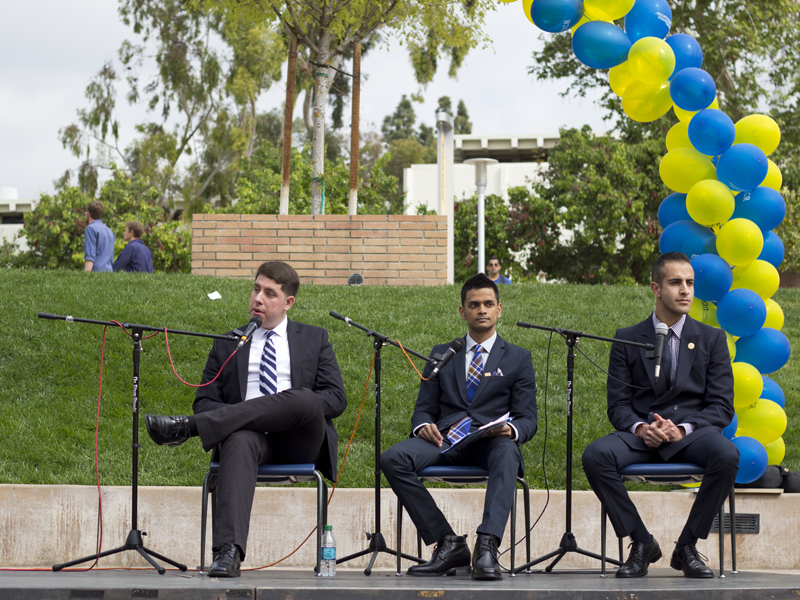
Over 50 members of the UCR community hustled over to the Highlander Union Building (HUB) Plaza to watch the ASUCR presidential debates last Tuesday. Drawing a comparably larger crowd than last year, the event was moderated by the KUCR radio station and the Highlander’s Managing Editor Colin Markovich, who asked about issues of campus crime, four-year graduation rates and presidential goals. Three current members of ASUCR are vying for the 2014-15 presidency: Armando Saldana, Sean Fahmian and Nafi Karim.
Saldana, ASUCR’s executive vice president of two years, represents the Vox Populi party, or “Voice of the People,” under the platform of: “Empowered we are, united we stand, together we can.”
As a programmer for the Highlander Union Administration office and resident advisor for UCR’s Housing, Dining and Residential Services, Saldana has also maintained the internal and external processes of the senate by establishing order during the ASUCR senate meetings. He seeks to maintain a presence and strengthen ties with both the campus administration and local community.
“We’re one of the few (associated students) campuses that have maintained their autonomy,” he said. “It’s not just showing a presence, but showing that we have a voice and we’re not just here for an education, but we’re also here to improve UCR’s (promise for higher education).”
Additionally, Saldana alluded to an email he received from a community member over the summer, which called UCR students visitors to the city of Riverside.
“That bothered (because) some of us actually live here. Whether we’re still a commuter school or not, we’re still part of the city (and) we still contribute to the overall well-being of the city,” he explained. “One of the things that we need to focus on is increasing the communication with the city.”
As a Bourns College of Engineering (BCOE) senator of two years, Fahmian is the presidential nominee for the political party A Better Choice (ABC), which holds a platform of “value, voice and vision.” Drawing from his family and community ties to the university, Fahmian referred to his experiences of growing up in Riverside, where he would often swim in the pool near the physical education building.
With the desire to create a greater sense of belonging on campus, Fahmian advocated profusely for additional Meet the Senate events, where students were allowed to jot down their concerns on a whiteboard and interact with members of ASUCR. Additionally, Fahmian formerly served as an orientation leader, worked at the Well for two years and attended two Common Grounds summer sessions.
“As orientation leader you’re literally trained to know this campus, to love this campus; it’s put upon you to make this campus your own and to have that translate into the incoming first-year students so they come onto this campus and they are also inspired,” he said. “You’re just one of the 18,000 students. Your voice is not heard.”
When asked what steps would be taken to improve the four-year graduation rate in the wake of a task force report, Fahmian said there needed to be additional advisors, citing the example that there is one political science advisor for over 2,000 students in the department.
“If this task force is aimed at making sure that students graduate in four years, maybe we should reevaluate how motivated the students are within their college,” explained Fahmian.
Lastly, College of Humanities, Arts and Social Sciences (CHASS) Senator Karim is aligned with [YOUR]SIDE, which pushes for greater “pride, progress and empowerment” within the student body. As the president of Kappa Sigma, Karim said, “I empowered over 70 men to do over 6,000 hours of service. As your leader I will continue to empower the students by bringing lasting change to our campus.”
During the debate, Karim advocated for the creation of a student community center through housing, the expansion of Wednesday nooner programs to include exhibition games with UCR athletes, and a weeklong diversity festival among the gender and ethnic programs. He also suggested the distribution of free UCR gear to incoming freshmen and upperclassmen who attend campus events.
“You can’t just sit in your ASUCR cubicle and wait for students to come to you during office hours,” he said. “We need to go out and survey the students formally and informally. I know why I am serving and I stand up for my students.”
In addressing campus crime, Karim alluded to his former position as the local affairs director of the ASUCR External Affairs Office, which pushed for the installation of additional surveillance of Linden and Rustin streets and the beautification of the area.
When asked about ways he has empowered students and improved campus climate, Karim said, “I cannot tell you what a queer woman of color feels, but I will work to provide her with her own voice … I can’t speak for other people, but I can get them the tools to speak for themselves, so each of the community voices are heard concisely.”
UCR undergraduates will be able to vote from April 21-25 during the ASUCR Elections Week; at least 20 percent of the voting student body must vote to validate the results of the presidential elections, which will be based on a simple majority vote.








